This week’s message (Friday 09 September 2022)
Posted on 09 September 2022 by Mr Roundtree
We’re sad to note the death of HM Queen Elizabeth II. She demonstrated and represented important values and behaviours. In school today, we have marked this historic moment with a special assembly and teachers have followed this up with a review and reflection in class.
Our first weekly message of the year continues with some important information for the year ahead at St James’ CE Primary School…
Dates for the year
Key dates for the school year are in our school calendar. We’ve prepared this list for you to print out and have ready to check, too.
Support your child at home
Like last year, we’re hosting a series of Zoom presentations to help you support your child’s learning at home – the first one is this Monday.
The invitation is open to all parents and carers across Sphere Federation, although we’ve indicated if the session might be more appropriate for particular age ranges. The full list of presentations are:
- Phonics and early reading: 12 September 2022
- Story telling: 19 September 2022 (Mrs Payne here at St James’ CE Primary will read a story over Zoom for your child and you to enjoy – the session is ideal for children in Reception, but children in Year 1 and 2 are welcome to join, too.)
- Number (KS1): 03 October 2022
- Number (KS2): 10 October 2022
- Topic: 07 November 2022
- Reading and Writing: 14 November 2022
- Online safety: 28 November 2022
- Key Stage 2 SATs: 09 January 2023 (This one is mainly for parents of Y6 children.)
- Key Stage 1 SATs: 27 February 2023 (This one is mainly for parents of Y2 children.)
- Reception to Year 1 transition: 19 June 2023 (This one is for parents of Reception children.)
All the sessions are at 6pm on Mondays and should last around 30 minutes.
If you’re interested in attending any of these Zoom workshops, please either send us a message on the School Gateway app or email the school office. We’ll then email the Zoom joining details out to all those who have expressed an interest.
Homework
Your child’s first homework task is published today.
Homework is an important part of education and gives you a chance to support your child and find out what they’ve been learning. This doesn’t need to be sitting at home with a stack of worksheets or creating an elaborate project: quality time talking to your child and practising basic skills is enough.
Today, we’ve given each child a new homework book. The book is for your child to practise spellings, writing, times tables and number facts. It doesn’t need to be sent back to school.
This homework guide sets out what we expect children to do and why. Reading, spellings, times tables and number facts are essential for all children to be confident with. The focus of your support at home should be ideally around these areas. Your comments in the Reading Record book (at least once a week) are really helpful for your child’s teacher.
As always, contact school if you have any questions or concerns.
Children settled into the new school year really well this week. It’s likely they’ll feel tired after a busy week back. Have a restful, happy and healthy weekend.
PE days
Posted on 05 September 2022 by Miss Beatson
Below are the days your child will be doing PE. Please ensure your child comes to school wearing the correct PE uniform.
Reception: Wednesday
Year 1: Monday and Friday
Year 2: Tuesday and Thursday
Year 3: Thursday and Friday
Year 4: Tuesday (swimming) and Friday
Year 5/6: Tuesday and Friday
Our annual survey 2022
Posted on 19 August 2022 by Mr Roundtree
Every year, we invite you to complete an annual survey of parents and carers. Thank you to the 22 people who completed this year’s survey.
Most of the questions we asked were based on those that Ofsted use for their Parent View. This gives you the chance to tell Ofsted what you think about your child’s school, from the quality of teaching to dealing with bullying and poor behaviour.
We’re delighted that the statements prompted very good responses: the following questions all had a 100% opinion outcome:
- Is your child happy at school?
- Does your child feel safe at school?
- Does St James’ CE Primary make sure its pupils are well-behaved?
- Do we make you aware of what your child learns during the year?
- Does St James’ have high expectations for your child?
- Is your child doing well at school?
- Is there a good range of subjects available to your child?
- Does St James’ CE Primary promote its Christian ethos effectively?
- Our vision is to be a happy and healthy place to achieve and believe. Overall, do we achieve this?
- Would you recommend this school to another parent?
The other questions we asked typically had a positive response rate of 95%.
We asked if you’re aware of bullying at the school. The vast majority of respondents were not aware. However, there was a small minority who said they were. Our definition of bullying is Several Times On Purpose and our solution is Start Telling Other People. Please do make sure you alert us about any concerns you may have.
We asked if you’ve ever had to raise a concern. We’re pleased that the vast majority who had raised something replied that it was dealt with well – ‘On both occasions my concerns were acknowledged within a very short space of time’ and ‘The teacher was great at explaining and helping’ were typical comments. As always, please do make sure you raise concerns – your child’s class teacher is usually around at the end of the day.
The last question was an open-ended one: we invited any comments you may have. There were 12 comments here, and the majority of these were positive – thank you.
[My daughter] has really developed and has thrived in the warm atmosphere and kind yet high expectations of the teaching staff.
I am particularly impressed at how the older children feel a sense of responsibility for the younger students, all the way down through the academic years.
Both my children and I love this school. The staff are wonderful and so caring. I feel the communications are excellent and the children have fantastic opportunities to develop and grow. I appreciate Miss Beatson being present on the school gates each week.
We’re keen to keep improving. We’ll review the suggestions, which included comments about uniform (introduce a polo shirt colour?). We’ll also make sure staff are aware of the praise they’ve earned.
Thank you to those parents / carers who completed the survey.
As always, please contact us with any questions, comments and concerns during the school year.
Have you entered our Summer competition yet?
Posted on 06 August 2022 by Mr Roundtree
Stay alert to happy and healthy faces all around you…
We want to see your pics of hidden smiley faces in your surroundings: a walk in woods or a play on the beach might include creating a smiley face, for example! Here’s our suggestion (look for the smiling face!)…

…but we’re sure you can do better!
Look out for things around you that show a hidden smiley face – a happy and healthy face – or encourage your child to create their own from things around them (pebbles, leaves, Lego…). (Just avoid obvious and intended smiling faces like the ones featured in the Breeze list of summer dates from last week’s message – they’re too easy to spot!)
To enter, email your pics to stjamesoffice@spherefederation.org by Friday 09 September. Enter ‘Summer competition’ as the subject.
All entries will be displayed in a happy and healthy display in school, and there are prizes for our favourites.
Our Summer competition
Posted on 25 July 2022 by Mr Roundtree
We’re a happy and healthy place to achieve and believe!
Over the Summer weeks, we want you all at home to stay alert to happy and healthy faces all around you… and take a pic of any hidden smiley faces in your surroundings: a day out at the beach might include creating a smiley face, for example! Here’s our suggestion (look for the smiling face!)…

…but we’re sure you can do better!
Look out for things around you that show a hidden smiley face – a happy and healthy face – or encourage your child to create their own from things around them (pebbles, leaves, Lego…). (Just avoid obvious and intended smiling faces like the ones featured in the Breeze list of summer dates from last week’s message – they’re too easy to spot!)
To enter, email your pics to stjamesoffice@spherefederation.org by Friday 09 September. Enter ‘Summer competition’ as the subject.
All entries will be displayed in a happy and healthy display in school, and there are prizes for our favourites.
This week’s message part 2 (Friday 22 July 2022)
Posted on 22 July 2022 by Mr Roundtree
The bulk of our last message of the school year comes from Miss Beatson. Before that, we’ve an updated uniform policy. Also, we’ve been asked by Leeds City Council to provide you with some important information…
Uniform
Most parents and carers stock up on fresh uniform over the summer holiday, so we want to let you know about our updated policy now.
This year, we’ve been trialling something we introduced in Covid times: wearing PE kit on PE days. Overall, we like this: it increases time for PE (no changing into kit) and there’s less lost property. However, we’ve seen some deviation from our uniform policy on PE days with some branded tops and shorts sneaking in. Check out our updated policy, especially the part about PE kit. We hope you’ll agree that the changes should actually save you money and be much more convenient for you.
Prevent
This letter is to help raise your awareness of the dangers of radicalisation and to let you know where to get more information, advice and support if you do have any concerns. This leaflet provides a summary about the Prevent programme and how, through the ACT Early website and Support Line, those who are vulnerable to radicalisation can get the help they may need.
And now over to Miss Beatson…
Another year is almost done and what a wonderful year we have had! It’s been so lovely to be able to go back to normal school life. We’ve been able to have parent visits to classrooms, coffee mornings, church services, KS2 productions, school trips and a Year 6 residential – all so important for our children.
The last week of the year is always busy but it’s especially busy for our Year 6 children. With productions, leavers’ service, leavers’ assembly and high school transition meetings, it’s certainly been an intense week. However, the children have embraced every moment, showing resilience and maturity, which makes me confident they’re ready to move on to secondary school. We wish them all the best for the future.
We’re saying a few goodbyes to staff, too: Mrs Flynn, Mrs Boulton and Mrs Wood, but we’ll continue to work with them as they’re still teaching in Sphere Federation. Mr Mills is also leaving to concentrate on his successful coaching company.
We’re going to miss them all so much and I’d like to thank them for all their hard work and commitment.
With departures come arrivals. In September, Mr Freeman will join the Year 5/6 class, Miss Kay will be in Year 2, and Miss Ward in Nursery. Mrs Payne will be the teacher in Reception, although she has been with us at St James’ for the last few months. We’re looking forward to welcoming them all to our school family.
I hope you all manage to relax, have fun and spend some quality time with your children this Summer. I look forward to seeing lots of happy and healthy faces on Tuesday 06 September.
Joseph and the Amazing Technicolour Dreamcoat
Posted on 20 July 2022 by Miss Beatson
Tonight, Key Stage 2 performed Joseph and the Amazing Technicolour Dreamcoat- it really was amazing! The children sang their hearts out and made everybody really proud. Thank you to all the staff who put together a fantastic show and a special shout out to Mrs Valentine’s Mum who spent many hours creating the iconic dreamcoat.
Well done to all the children- it was a huge success!

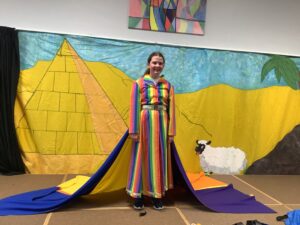
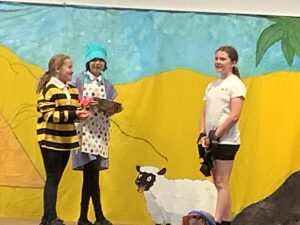
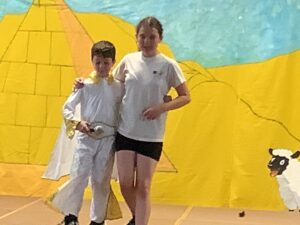
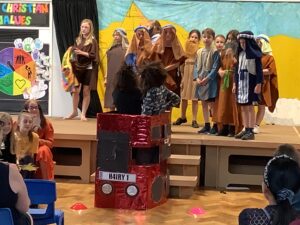
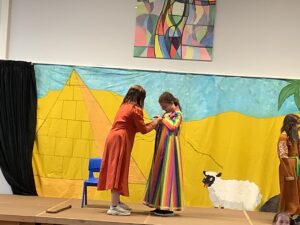


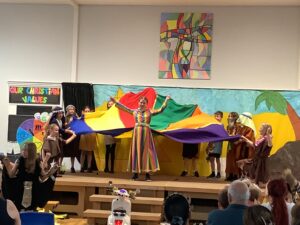
This week’s message part 1 (Tuesday 19 July 2022)
Posted on 19 July 2022 by Mr Roundtree
It’s the last week of term. This week, we’ve two messages.
This first one kicks off with a thank you to all of you who worked with us, sending your child into school despite the extreme temperatures. We worked hard to ensure the children remained as comfortable as possible – on the whole, I think we succeeded!
The rest of this message has contents that come from other organisation, but which you may find helpful, especially the first item…
Using A&E?
Leeds Teaching Hospitals are experiencing extreme demand for services. They’re seeing increasing visits to paediatric emergency department with needs that may be better met in other ways.
With consistent, accurate and trustworthy healthcare advice, the West Yorkshire Healthier Together website is available to support families to decide if a visit to A&E is appropriate.
The information on the site has been reviewed by local paediatricians, GPs and clinicians across the region to ensure it aligns with current practices and procedures.
You can use the quick links, search bar, or menus to find clear advice with easy to use traffic light guide, red, amber, green found in the parents/carers section. This will help to identify when, where, and how you should seek help for your poorly baby or child.
Parent and carers can also look through the site for practical guidance such as ‘should my child go to school’.
Music summer club
Leeds City Council and ArtForms are hosting free music summer clubs this August, with a range of music activities for children in Leeds aged 8 and above.
The sessions will take place between 08 and 10 August at Horsforth School. Read more.
Child friendly Leeds
This July marks the tenth year since the launch of Child Friendly Leeds. To mark the event, you and your child might want to attend the Our Leeds Wishes Display | Leeds Inspired this weekend.
Look out for our final message of the school on Friday.
Extreme temperatures - an update
Posted on 18 July 2022 by Mrs Quirk
We’ve coped well today in the heat, helped by moving classrooms, cool clothing and staying in at break times.
However, by mid-afternoon, it was uncomfortable around school.
The peak temperature of 38 degrees is predicted between 2.00pm and 4.00pm. Based on this, we’re suggesting a pick-up time of 1.30pm tomorrow, Tuesday 19 July, if you can.
Extreme temperatures forecast
Posted on 17 July 2022 by Mr Roundtree
We all know about the extreme temperatures forecast for the first part of next week. The Department for Education is not advising that schools close; instead they have issued guidance to schools.
Please note there is a possibility we may need to close early, or invite you to collect your child from 1.30pm. We’ll let you know if this is the case as soon as we can.
Apologies: we haven’t advised on this earlier as we’ve been waiting more guidance and continued monitoring of weather forecasts. (And a lot depends on the day: a strong breeze, like today, will help make the next couple of days bearable, if there is one.)
In case you missed Friday’s message, the guidance sets out sensible points to follow – make sure you consider each of the following:
- make sure your child comes to school with a large bottle (it could have water previously frozen)
- your child should wear a sun hat and loose, cool clothing (we’re relaxing the rules around school uniform – replace uniform items with things that are cooler eg open sandals rather than shoes, uniform shorts with lighter PE shorts – try to stay as smart as possible)
- your child should be wearing Factor 50 sunblock when they arrive at school and may apply more during the day
In school, we’ll take as many actions as we can. These will include indoor lunchtimes, avoiding vigorous activity, and avoiding being in large groups in one indoor space for a longer time.